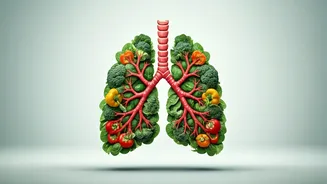Food and Lungs
The food we consume significantly impacts our bodies, and our lungs are no exception. The lungs, essential for oxygen exchange, can be negatively affected
by certain dietary choices. Understanding the connection between food and lung health is vital to making informed decisions that support our respiratory system. Some foods contain compounds or trigger reactions within the body that can lead to inflammation and irritation in the lungs, making breathing more difficult. These foods can exacerbate existing respiratory conditions and increase the risk of developing new ones. By identifying and limiting these foods, we can contribute to healthier lungs and improved overall well-being.
Processed Meats
Processed meats, often containing high levels of sodium, can trigger inflammation throughout the body, including the lungs. The preservatives and additives in these meats can also irritate the respiratory system, potentially leading to increased mucus production and airway constriction. Regularly consuming processed meats has been linked to a higher incidence of respiratory problems and a decline in lung function over time. Examples of processed meats include bacon, sausages, and deli meats, which are often high in nitrates, compounds that can contribute to airway inflammation. Reducing your intake of processed meats and choosing lean protein sources can significantly benefit lung health.
Sugary Drinks
Sugary drinks, such as sodas and sweetened beverages, can be detrimental to lung health due to their high sugar content. Excessive sugar intake can lead to systemic inflammation, which can affect the lungs and make breathing more challenging. These drinks often contribute to weight gain, and obesity is a risk factor for respiratory conditions like asthma and sleep apnea. The inflammation triggered by high sugar levels can also weaken the immune system, making the lungs more susceptible to infections. Regularly consuming sugary drinks provides little to no nutritional value while increasing the risk of respiratory issues.
Dairy Products
Dairy products can impact some individuals' lung health due to their potential to increase mucus production. For those sensitive to dairy, excessive mucus can clog airways, making breathing difficult and potentially worsening conditions like asthma and chronic bronchitis. The proteins found in dairy products can sometimes trigger allergic reactions or sensitivities, leading to inflammation in the respiratory system. Not all people are affected, and the impact of dairy varies individually. If you notice an increase in mucus production or breathing difficulties after consuming dairy, consider reducing your intake or exploring dairy alternatives.
Fried Foods
Fried foods are often loaded with unhealthy fats and can negatively impact lung health. During the frying process, harmful compounds can be created that can irritate the lungs when inhaled. These foods also contribute to weight gain, increasing the risk of respiratory problems associated with obesity. The high-fat content in fried foods can lead to inflammation in the body, which can affect the lungs and make breathing difficult. Often, the oils used for frying break down at high temperatures, producing substances that can trigger inflammatory responses in the respiratory system. Therefore, reducing the consumption of fried foods can help support healthy lungs.
Refined Grains
Refined grains, such as white bread and pasta, offer minimal nutritional value and can contribute to inflammation in the body. These grains are often stripped of their fiber and nutrients, leading to rapid blood sugar spikes. This can result in an inflammatory response that impacts the lungs. Furthermore, refined grains have been associated with a higher risk of respiratory conditions, potentially worsening symptoms in those with existing problems. Replacing refined grains with whole grains rich in fiber can help stabilize blood sugar levels and reduce inflammation, supporting better lung health.
Salty Foods
Excessive salt intake can lead to fluid retention, which can exacerbate respiratory symptoms in some people. High sodium levels can increase the workload on the lungs and worsen breathing difficulties, especially in those with heart or respiratory conditions. Salty foods often trigger inflammation, contributing to respiratory issues. The body's response to excess sodium can cause airways to constrict, making it harder to breathe. Reducing the consumption of salty snacks and processed foods can help manage fluid balance and support overall lung health, promoting easier breathing.














